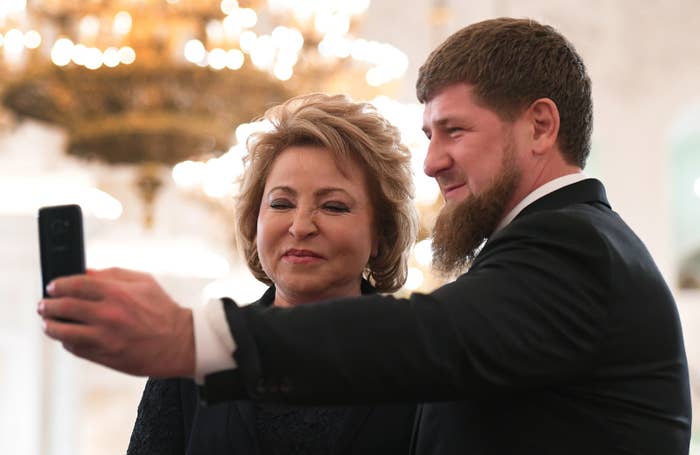
The Russian Embassy to Israel said an investigation into the reported kidnapping and torture of dozens of gay men in Chechnya found that "there are no victims of persecution, threats or violence."
The statement came in a lengthy letter to Israel's Haaretz newspaper published on Thursday. It was formally a response to a story Haaretz published on April 5, describing secret detention facilities where gay men have reportedly been tortured in widespread crackdown in Chechnya, an autonomous region in the Russian Federation.
News of the crackdown was first broken in April by reporter Elena Milashina of the Russian Novaya Gazeta newspaper and since corroborated by international news outlets and human rights groups. Chechnya's leader, Ramzan Kadyrov, has said that there is no crackdown because that there are no gay men at all inside his territory. But last Friday Russian President Vladimir Putin bowed to international pressure and agreed to investigate the reports.
The Russian Embassy's letter to Haaretz, however, suggests that an investigation has already been concluded.
"Authorized official government bodies of the Russian Federation, in cooperation with the government of the Chechen Republic, investigated the claims made by journalist Elena Milashina in her articles published in the Novaya Gazeta newspaper and in other Russian media outlets," wrote Press Attache Dmitry Alushkin.
Citing the "results of the investigation," Alushkin wrote that there "are no victims of persecution" in the republic, offering as further evidence that neither the Chechen human rights body nor law enforcement have received reports of these abuses. (LGBT rights organizations have said that victims are frightened of retaliation for reporting their abuse.) An alleged secret prison, he wrote, "is a storeroom."
Alushkin also wrote that activist Nikolay Alexeyev has rejected the reports. Alushkin calls Alexeyev the "head of the LGBT community in Russia," but he is in fact a highly controversial figure who defended the Russian government during the controversy over the so-called "gay propaganda" law in 2013.
"In light of this, the Russian Embassy in Israel expresses its regret that a few Israeli citizens did not wait until the publication of the results of the objective investigation and rushed to spread factually incorrect information in the local media," Alushkin wrote. "We would like to note that the Russian system of government is of a democratic nature and we are calling to rely on objective and reliable data — and not on rumors and speculation — to analyze the political developments in our country."
The Russian Embassy in Washington did not immediately respond to a request for the findings of the inquiry Alushkin describes.
Here's the full text of his letter:
Authorized official government bodies of the Russian Federation, in cooperation with the government of the Chechen Republic, investigated the claims made by journalist Elena Milashina in her articles published in the Novaya Gazeta newspaper and in other Russian media outlets, which served as the excuse for the beginning of a propaganda campaign against Russia around the world, including in Israel.
The results of the investigation show that these reports were published after local governments in a few North Caucasus regions of Russia, in March 2017, rejected requests from representatives of the LGBT community to hold rallies. The reason was protests of civil society representatives and residents of the regions, who are mostly Muslims and faithful to traditional values.
In the building – which in the past belonged to the military government (address: 99B Kadyrov Street, in the city of Argun) and called in the articles a “secret prison” – is a storeroom, while a parking lot is located on the nearby space.
There are no victims of persecution, threats or violence. Neither law enforcement authorities or the Human Rights Council of the president of the Chechen Republic have received complaints on this matter. The Human Rights Council conducted an inquiry of its own and did not find even indirect evidence of such accusations.
The false reports resonated within the society and spiritual leadership of the Chechen Republic. On April 2, a Majlis (Muslim council) was held in the central Heart of Chechnya Mosque, with the participation of some 6,000 residents and community elders. On April 6, human rights activists, journalists and public figures held a discussion in Chechnya on the topic “Caucasus traditions in the reality of the world today.” The participants traveled to the city of Argun and there, on the spot, were convinced of the falseness of the claims of the existence of the alleged “secret prison.”
The head of the LGBT community in Russia, Nikolay Alexeyev, also rejected the reports. In an interview with the television station Dozhd and on the radio station Komsomolskaya Pravda, he harshly criticized Milashina and accused her of starting a propaganda campaign against Chechnya by publishing clearly false information. Alexeyev said, among other things, that in Chechnya they do not “hunt” representatives of the LGBT community. During his activities, not a single gay person from Chechnya has turned to him. He expressed the opinion that Milashina’s activities have no connection whatsoever to protecting the rights of gays, and Milashina has her own agenda.
In light of this, the Russian Embassy in Israel expresses its regret that a few Israeli citizens did not wait until the publication of the results of the objective investigation and rushed to spread factually incorrect information in the local media.
We would like to note that the Russian system of government is of a democratic nature and we are calling to rely on objective and reliable data – and not on rumors and speculation – to analyze the political developments in our country.
